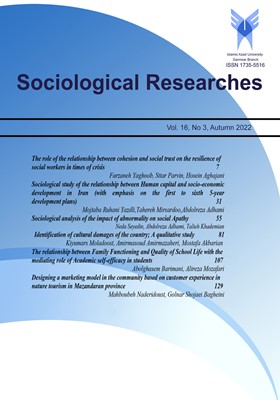Sociological study of the relationship between Human capital and socioeconomic development in Iran (with emphasis on the first to sixth -year development plans)
Subject Areas :
Mojtaba Ruhani Yazdli
1
,
Tahereh Mirsardoo
2
*
![]() ,
Abdolreza Adhami
3
,
Abdolreza Adhami
3
![]()
1 - PhD Student of Sociology, Sociological Department, North Tehran Branch, Islamic
Azad University, Iran
2 - Associate Professor of Department of Governmental management, Central Tehran
Branch, Islamic Azad University, Iran
3 - Associate Professor of Department of Sociology,, North Tehran Branch, Islamic
Azad University, Iran
Keywords: سرمایه انسانی, Human Capital, نوآوری, development, Socioeconomic, specialty, تخصص, نخبه گرایی, Elitism, توسعه اقتصادی – اجتماعی,
Abstract :
The purpose of this study was to investigate the relationship between Human capitaland socio-economic development from the perspective of university professors anddoctoral students of Islamic Azad University, North Tehran Branch. The statisticalpopulation of the study was students on the one hand and professors specializing insocio-economic development on the other. The number of professors was 01 whowere selected using purposive sampling method with theoretical saturation. Thestatistical population of all PhD students in Sociology, Political Science andEconomics studying at the Islamic Azad University, North Tehran Branch, who werestudying in the second semester of - , was a sample of students. Thevalidity of the questionnaire was assessed by the face validity and reliability of thedata using test and retest methods and Cronbach's alpha test. In the survey of datacollection tools, a questionnaire was made by the researcher and in the qualitativestudy of the interview, it was semi-structured. The hypotheses have been formulatedusing social capital theory. The findings of the survey indicate that there is a strongsignificant relationship between the components of Human capital and socioeconomicdevelopment. The results of the qualitative study showed that the causalconditions of accountability, rule of law, general consensus, transparency, efficiencyand effectiveness, equal rights and responsibility have been identified and thecentral phenomenon of a single product economy in the field of private sectoractivity, independence of people and media, role The government, the participationof the government and the people, the political and organizational capacity of thegovernment, the government and the provision of welfare and the bedrock of thegovernment have emerged. Expertise, elitism and innovation as interveningconditions and single-product economics lead to social trust, social cohesion, socialsupport and social participation, which are the consequences of such actions andreactions: welfare, social security, social justice and public education. According tothese findings, it can be said that in good governance, prioritizing credible measuresfor political accountability, freedom of purposeful and efficient judiciary, freedom ofinformation and effective performance of government organizations are essential inthe process of comprehensive development of the country.
_||_

